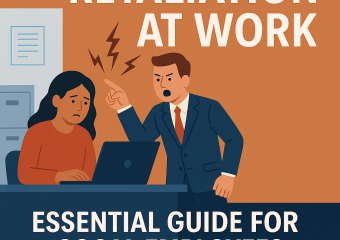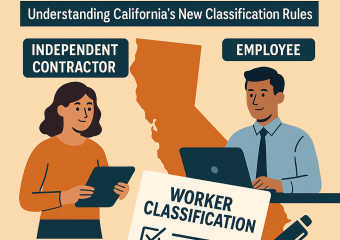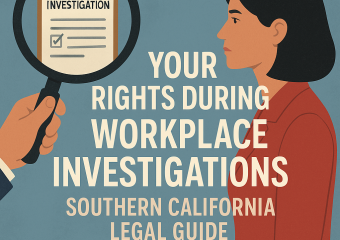Workplace Discrimination in Los Angeles: Legal Protections & Steps
Workplace discrimination in Los Angeles remains a pressing concern for many employees, despite numerous legal protections designed to safeguard workers’ rights. Whether rooted in race, gender, age, disability, or other protected characteristics, discrimination can severely impact an individual’s career, mental health, and overall well-being. Fortunately, Los Angeles provides various legal avenues and resources to address these issues, empowering employees to take informed action against unfair treatment.
Understanding Workplace Discrimination in Los Angeles
Discrimination in the workplace occurs when an employee or job applicant is treated unfairly due to characteristics such as race, ethnicity, gender, sexual orientation, religion, age, disability, or even pregnancy status. In a culturally diverse city like Los Angeles, where people from all backgrounds converge, ensuring equitable treatment at work is critical for fostering inclusive and productive environments.
The forms of workplace discrimination can vary widely: from being passed over for promotions and unequal pay to hostile work environments or wrongful termination. Often subtle, these practices create barriers to success and contribute to a toxic atmosphere that diminishes morale.
Legal Protections Against Workplace Discrimination in Los Angeles
Los Angeles benefits from robust state and local laws that extend beyond federal protections provided by acts such as Title VII of the Civil Rights Act, the Americans with Disabilities Act (ADA), and the Age Discrimination in Employment Act (ADEA).
California Fair Employment and Housing Act (FEHA)
One of the most comprehensive safeguards is the California Fair Employment and Housing Act (FEHA). This law protects employees and job seekers against discrimination and harassment in all aspects of employment. FEHA prohibits discrimination based on a broad spectrum of categories, including race, color, ancestry, national origin, sex, gender identity, sexual orientation, marital status, religious creed, medical condition, disability, genetic information, and more.
FEHA empowers employees to file complaints with the California Department of Fair Employment and Housing (DFEH), which investigates claims and can pursue legal action on behalf of complainants.
Los Angeles Ordinances
Beyond state law, the City of Los Angeles enforces its own regulations aimed at eliminating workplace discrimination and promoting diversity. The Los Angeles Municipal Code (LAMC) includes provisions that protect city employees and those working within city limits against discriminatory practices.
For example, the City’s Equality Ordinance mandates nondiscriminatory practices in city contracts and workplaces and encourages employers to implement diversity training and equitable hiring practices.
Steps to Take If You Experience Workplace Discrimination
Knowing the right course of action after experiencing discrimination can help victims protect their rights and seek justice. Here are actionable steps employees in Los Angeles should consider:
1. Document Everything
Accurate and detailed documentation can be pivotal in any discrimination claim. This includes keeping records of incidents such as discriminatory comments, emails, or behavior, along with dates, times, locations, and any witnesses.
2. Report Internally
Many employers have policies requiring employees to report issues through internal channels like human resources or designated managers. Filing an internal complaint can prompt an investigation and possibly a resolution without needing formal legal action.
3. Seek Legal Advice
Consulting with an employment attorney familiar with California law and Los Angeles ordinances can clarify your rights and help determine the strength and viability of your case. Attorneys can guide individuals through the complaint process or represent them in litigation if necessary.
4. File a Complaint with Government Agencies
If internal reporting does not resolve the issue, employees can file a complaint with government bodies such as the DFEH or the Equal Employment Opportunity Commission (EEOC). The DFEH, for instance, offers free mediation services and investigates discrimination claims thoroughly.
5. Consider Alternative Dispute Resolution
Some cases may benefit from mediation or arbitration, which can be faster and less adversarial than court litigation. These methods provide an opportunity for parties to negotiate a settlement under the guidance of a neutral third party.
The Importance of Awareness and Training
Preventing workplace discrimination involves proactive measures as much as it does reactive ones. Employers in Los Angeles are increasingly recognizing the value of inclusive workplaces not only as a legal obligation but as a strategic advantage. Diversity training, clear policies, and open communication channels help create cultures where all employees feel respected and valued.
Employees should also educate themselves about their rights so they can recognize discrimination early and respond appropriately. Community organizations and labor unions often provide workshops and support groups focusing on workplace rights, which can be invaluable resources.
Moving Forward: A Fairer Workplace in Los Angeles
Workplace discrimination in Los Angeles is a complex challenge that intersects with broader social and cultural issues. However, the city’s legal framework equips workers with powerful tools to fight injustice. By understanding the protections available and the steps to take when discrimination occurs, employees can safeguard their dignity and contribute to more equitable professional environments.
Ultimately, combating discrimination requires commitment from all stakeholders—employers, employees, policymakers, and advocates. Together, they can foster workspaces where talent thrives free from prejudice, enabling Los Angeles to continue its role as a vibrant and diverse economic hub.




